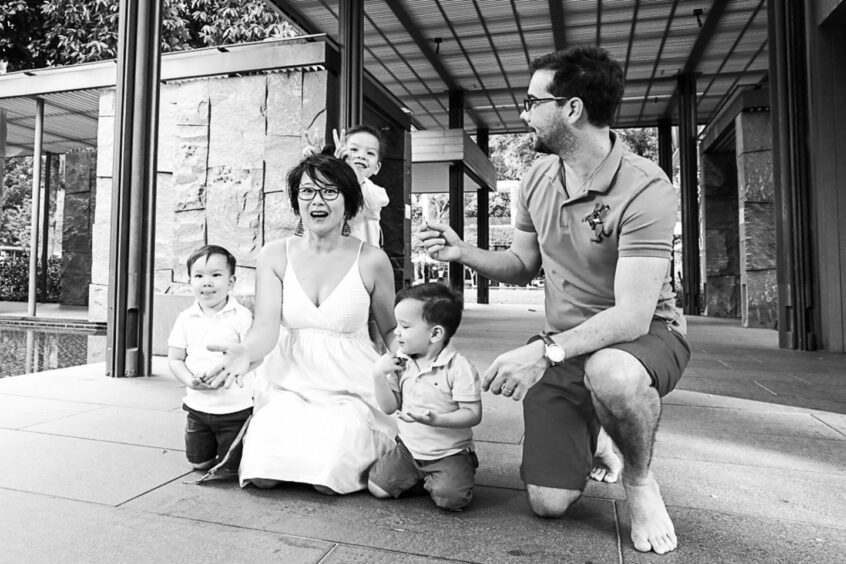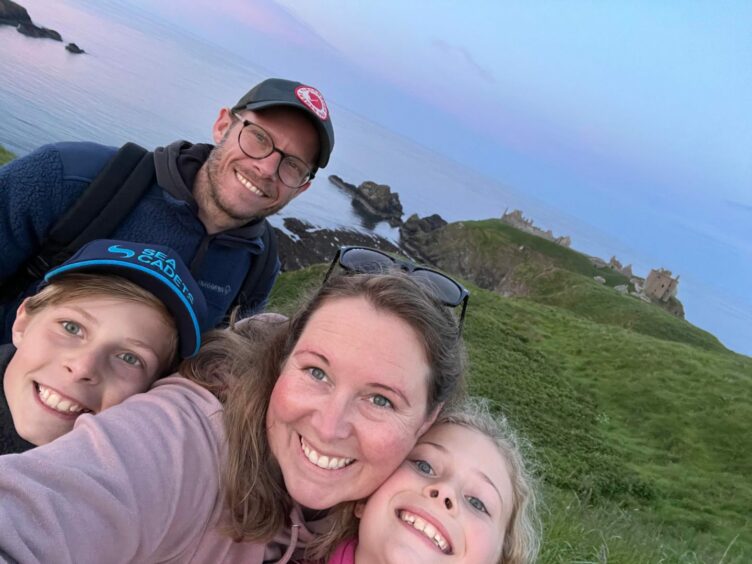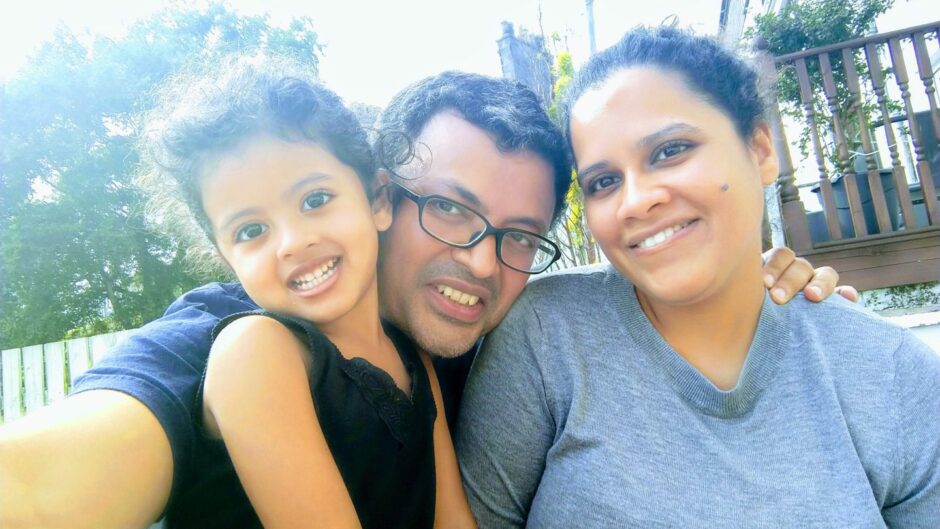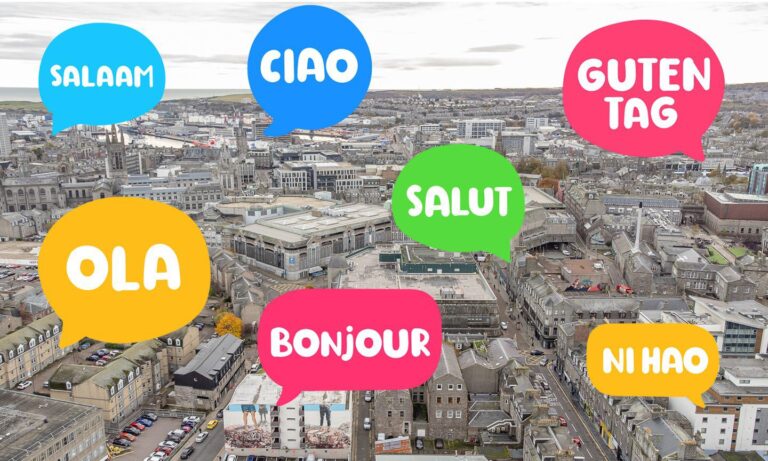We all want our children to grow up to be open-minded citizens of the world.
One of the best ways to broaden our horizons is to learn another language – and the younger the better.
To mark today’s European Day of Languages, the P&J spoke to five multilingual families living in Aberdeen.
The Granite City has long been a multicultural place, particularly since the oil industry took off in the 1970s.
As an example, Hanover Street School pupils speak a whopping 19 different languages at home.
Juliette Kinn Valdelievre doesn’t exaggerate when she says hers is an “international family”.
The fact that Arthur, seven, and five-year-old twins Hadrien and Thomas speak French at home tells barely half the story.
Three kids, three languages
Juliette was born in Cambodia but grew up in France. Though her first language is French she spoke Cambodian at home with her parents growing up.
Her husband Alex, who is French, has previously lived in Hong Kong and South Africa.
“My husband and I love languages and love travelling,” she said. “We always took any opportunities for internships or work in different countries.”

The pair left Paris in 2014 and spent four years in Beijing where their children were born. The family spent a further four years in Singapore before moving to Aberdeen this summer.
Though the Kinn Valdelievres speak French at home, their children hear many different languages every day as they attend an international school in the city.
“I think growing up hearing so many languages is a huge benefit for the children and their learning journey,” said Juliette.
“Their classmates in Singapore were from all over the world – India, Korea, the US, Canada, Japan, China, Norway, Germany, Finland and many more.
“Our children are fluent in French, English and Chinese Mandarin. They recognise other languages as well.”
Open-minded and self-confident
As impressive as multilingual kids are, keeping up other languages requires constant effort.
Juliette spoke of a “strict routine” and “persistence.”
She said: “While their friends go and play, they have extra language classes. As long as we keep it easy and fun, our children can cope with the routine.
“It’s just amazing how they can have a feel for different languages and be able to translate as young as four years old.
“Knowing another language helps them open their mind and be more tolerant.
“It also boosts their self-confidence. The twins are always so proud to tell people they can speak four languages (if you count a few words of Cambodian!), and see other adults so impressed.
“I would definitely recommend learning foreign languages at a young age – and non-latin languages would be an extra benefit.”
‘They know about different cultures and are quick to include any new friends’
Eni Gröner and husband Cauê said it was a “no brainer” to speak their native languages of Finnish and Brazilian Portuguese at home. Their kids are four and eight years old.

“We were confident they would pick up English at nursery and school,” said Eni.
“Through having different languages, they have a greater understanding of the culture [of Finland and Brazil]. And possibly also a sense of ‘belonging’, even though they have not lived in those countries.
“I believe they’ll be able to pick up additional languages a lot easier in the future as well. Both can understand spoken Spanish already.
“On my husband’s side, the children are able to communicate with their relatives in Portuguese, as very few speak English.
“We’ve got several Portuguese-speaking friends here in Aberdeen, which keeps up their language skills.
“The main benefit I believe is that they know about different cultures and are quick to include any new friends in their games.
“I hope they’ll grow up to be open-minded teenagers and adults as a result.”
‘Kids should start learning from Day One in school – at least’
The Torazzina family speak Italian at home. Mum Erika said that having another language helped her kids see things from a different perspective.

Alessia, 12, Joshua, nine and Jack, five, have been bilingual from the moment they began speaking.
“I am convinced that a language can be learnt simply by listening and talking, especially at a young age,” said Erika. “No need for rules, books, or homework – just practice.”
She added: “Kids should be encouraged to start learning one foreign language at least from Day One in school.
“Mother tongue teachers are preferable, and extra-curricular activities in a foreign language prioritised.
“I have experience teaching English as a foreign language and the most effective method I ever used was to speak only English in class. Never a word in the language that could help the kids, no translations. It’s hard at first but brings great results.”
‘They feel special when they can speak Dutch’
Meanwhile the van den Einde-Shiels family speak both Dutch and English at home.
Mum Lisette said the benefits very much outweighed the challenges.

“It can be hard to persistently speak Dutch with the kids at home, as they get English at school, English on the street, and English with friends,” she said.
“Visiting the Netherlands benefits them – their Dutch always takes a massive leap forward. They feel special when they can speak Dutch, and it feels comfortable for them.
“I also think it opens their mind to other languages – they’re both learning French and Spanish.”
She said that being exposed to another language from a young age had widened their horizons, and helped them realize that there’s a bigger world out there than their own town, their own country.
“Their world is definitely big,” she said.
Meet the six-year-old on her fifth language
Finally, Shashi Krishna and Jaya Rao’s daughter Anahita, six, already understands a handful of different languages.

Dad Shashi explained: “Growing up in India, me and my wife grew up speaking two or three languages at the same time. One language for home (native tongue), one for friends and relatives (Hindi or another language, depending on the state), and English for all other business.
“Despite English being the main language she communicates in, Anahita understands Hindi, Marathi and a little bit of Kannada. She is also taking Spanish lessons at school.
“This blended exposure is giving her some of the same benefits we got as kids, despite English’s dominant presence in her life.”
Reversing the foreign languages trend in Scotland
The Scottish Government implemented its 1+2 Languages initiative last year, in an effort to reverse generations of neglect in foreign language learning in Scottish schools.
Shashi thinks it is crucial that the curriculum reflects the multicultural reality of modern-day Scotland.
“We have come to a point in human history where it is commonplace to find various nationalities sitting down for a meal in any workplace or school,” he said.
“With such a clear multicultural reality, it makes perfect sense for Scottish schools to provide more opportunities to learn multiple languages.
“Knowing another language is like having another mind, and I see it being exemplified by our daughter each day.
“If we are to expect our kids to grow up to become global citizens who can blend in easily with any crowd, and be productive in forming meaningful relationships, then knowing multiple languages is a must.”
More from the Schools & Family team
The P&J investigates: Why are other countries’ school pupils outperforming ours?
I banned my kids from screens for a week: What happened next?
Real Life Parenting Dilemmas: Is it possible to have a good work-life balance?
Already a subscriber? Sign in
[Meet the north-east children speaking multiple languages]
[[text]]



